5 Must-Know Tips for Parenting ADHD Teens | Ryan Wexelblatt, LCSW – Founder, ADHD Dude)

If you’re raising a teenager with ADHD, you’ve probably realized by now that traditional parenting advice doesn’t always apply. The emotional ups and downs, the impulsivity, the arguments, and the resistance to anything that looks like responsibility—it’s exhausting. But your child isn’t broken. And you’re not doing anything wrong. What you need are strategies that align with how the ADHD brain actually works during the teen years.
In my work as a licensed clinical social worker, a former school social worker in special education settings, and a father to a son with ADHD and learning differences, I’ve seen what does—and doesn’t—help teens with ADHD grow into confident, independent young adults. And that’s why I created programs like Scaffolding Better Behavior, which help parents use structure—not lectures or therapy talk—to change behavior at home.
Here are five must-know tips for parenting ADHD teens that I’ve seen change the trajectory for families just like yours.
1. Stop the “High-Giving, Low Expectations” Trap
Many parents I work with are incredibly generous. They want their teen to feel supported and cared for, so they provide access to the latest tech, extracurricular activities, clothes, and comforts. But here’s where things break down: those same teens are often given very few expectations in return. No real responsibilities at home. No accountability outside of grades.
What happens next is predictable—kids become self-centered, entitled, and inflexible at home while still functioning relatively well in school or other environments. They’ve learned that the rules of accountability don’t apply under their own roof.
ADHD teens need to feel useful. Giving them structure and daily responsibilities—whether that’s doing laundry, making their own breakfast, or contributing to household tasks—builds a sense of purpose. Even if they complain, these expectations are critical. Structure makes them feel secure. Contribution helps them feel capable.
2. Don’t Accommodate Inflexibility—Cultivate Flexibility Instead
It’s also important to understand that ADHD is an executive function developmental delay. That means skills like emotional regulation, time management, and cognitive flexibility don’t just show up because a teen turns 15—they develop 2–3 years behind same-age peers.
Flexibility—the ability to shift perspectives, adapt to change, and handle “no”—is one of the most important executive function skills for teens with ADHD. But here’s what I’ve seen for years: when inflexibility is constantly accommodated by parents, it gets worse. I call this the inflexibility tipping point. It usually shows up between ages 13 and 15, particularly in boys.
When parents avoid conflict by giving in, changing plans, or trying to reason through every emotional outburst, they unintentionally reinforce rigidity. But when you stop accommodating and begin setting boundaries around flexibility, it’s uncomfortable—but transformative.
3. Start Having Realistic Conversations About the Future at Age 14
Another must-know tip for parenting ADHD teens is to have realistic conversations about the future—starting around age 14. Too often, I hear well-meaning parents say, “You can be anything you want.” And while that sentiment is loving, it’s not always grounded in reality. Not every kid is going to be a famous YouTuber, a video game designer, or a professional athlete.
That doesn’t mean we crush dreams. It means we teach teens how to think critically and create backup plans. It means we talk openly about what it actually takes to pursue certain careers and help them connect the dots between effort and outcome.
I’ll never forget the time my son told his psychiatrist he wanted to be an engineer. She didn’t dismiss him. She simply laid out what it would take: hard work in school, strong math skills, and significant time spent on subjects that were difficult for him. That honest conversation helped reframe his expectations in a way that was both empathetic and grounded.
4. Step Back So They Can Learn Self-Advocacy and Indepdendent Problem Solving
Another common challenge: teens who can’t—or won’t—speak for themselves.
Whether it’s talking to a teacher, a doctor, or resolving a conflict, many ADHD teens lean heavily on their parents to do the talking. But if we’re always stepping in to smooth things over or prevent discomfort, we’re denying them the opportunity to develop self-advocacy and independent problem-solving skills.
One of the most helpful things I did with my son during high school was coach him through problems without solving them for him. If he had an issue with a teacher, we’d talk about it. I’d text him some language he could use, but he was the one responsible for the conversation. He had to learn to speak for himself—and he did.
5. Let Them Experience Discomfort, Distress, Disappointment, and (Mild) Danger
Finally, and perhaps most importantly, all teens need to experience what Dr. Camilo Ortiz calls the Four D’s: discomfort, distress, disappointment, and mild danger.
Too many teens today are shielded from these experiences—sometimes out of love, sometimes out of fear. But here’s what you need to know: these are the exact experiences that help teens develop resiliency, self-confidence, and social-emotional maturity.
Discomfort and distress teach teens that they can tolerate tough emotions and emerge stronger. Disappointment shows them that failure and rejection are survivable and part of life. Mild danger (the kind that pushes them slightly out of their comfort zone, not the kind that risks serious harm) gives them a chance to develop real-world competence.
I remember a moment when my son was 14 and we were in Vancouver. After an argument, he decided to head back to our hotel alone on the subway. I was terrified. But he did it. He navigated the city by himself—and that experience gave him a surge of confidence I could never have manufactured through reassurance or therapy talk.
If these five tips feel uncomfortable—that’s okay. You’re not failing. You’re stepping into the most important part of parenting an ADHD teen: learning to parent for their growth, not your comfort.
At ADHD Dude, we don’t teach theories or trendy parenting advice. We focus on structure, strategy, and building executive function skills in real life. If you’re looking for actionable support to help your ADHD teen build responsibility, flexibility, and confidence—without the endless negotiating—I’m here to help.
Looking for more must-know tips for parenting ADHD teens?
Visit the ADHD Dude YouTube channel and check out the various playlists there.











